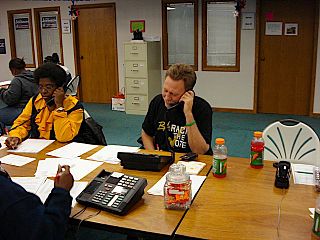
Telemarketing is a method of direct marketing in which a salesperson solicits prospective customers to buy products, subscriptions or services, either over the phone or through a subsequent face to face or web conferencing appointment scheduled during the call. Telemarketing can also include recorded sales pitches programmed to be played over the phone via automatic dialing.
Caller identification is a telephone service, available in analog and digital telephone systems, including voice over IP (VoIP), that transmits a caller's telephone number to the called party's telephone equipment when the call is being set up. The caller ID service may include the transmission of a name associated with the calling telephone number, in a service called Calling Name Presentation (CNAM). The service was first defined in 1993 in International Telecommunication Union – Telecommunication Standardization Sector (ITU-T) Recommendation Q.731.3.
A SIM lock, simlock, network lock, carrier lock or (master) subsidy lock is a technical restriction built into GSM and CDMA mobile phones by mobile phone manufacturers for use by service providers to restrict the use of these phones to specific countries and/or networks. This is in contrast to a phone that does not impose any SIM restrictions.
Telephone slamming is an illegal telecommunications practice, in which a subscriber's telephone service is changed without their consent. Slamming became a more visible issue after the deregulation of the telecommunications industry in the mid-1980s, especially after several price wars between the major telecommunications companies. The term slamming was coined by Mick Ahearn, who was a consumer marketing manager at AT&T in September 1987. The inspiration for the term came from the ease at which a competitor could switch a customer's service away from AT&T by falsely notifying a telephone company that an AT&T customer had elected to switch to their service. This process gave AT&T's competitors a "slam dunk" method for the unauthorized switching of a customer's long-distance service. The term slamming became an industry standard term for this practice.

Mobile phone spam is a form of spam, directed at the text messaging or other communications services of mobile phones or smartphones. As the popularity of mobile phones surged in the early 2000s, frequent users of text messaging began to see an increase in the number of unsolicited commercial advertisements being sent to their telephones through text messaging. This can be particularly annoying for the recipient because, unlike in email, some recipients may be charged a fee for every message received, including spam. Mobile phone spam is generally less pervasive than email spam, where in 2010 around 90% of email is spam. The amount of mobile spam varies widely from region to region. In North America, mobile spam steadily increased after 2008 and accounted for half of all mobile phone traffic by 2019. In parts of Asia up to 30% of messages were spam in 2012.
In telecommunications, directory assistance or directory inquiries is a phone service used to find out a specific telephone number and/or address of a residence, business, or government entity.
Phone fraud, or more generally communications fraud, is the use of telecommunications products or services with the intention of illegally acquiring money from, or failing to pay, a telecommunication company or its customers.

Vodafone Ireland Limited, a wholly owned subsidiary of the Vodafone Group, is a mobile phone network and broadband provider in Ireland. It was created when the Vodafone Group bought Eircell, the mobile arm of Telecom Éireann. As of September 2019, Vodafone has 26% of broadband subscribers, and 43% of mobile phone subscribers.
Area code 900 is a telephone area code in the North American Numbering Plan for premium-rate telephone numbers. Area code 900 was installed in 1971.
Salvatore LoCascio is a reputed former caporegime in the New York Gambino crime family. His father, Frank LoCascio, was the acting underboss (1988-1990), and acting consigliere (1990-1992) for John Gotti.
Customer proprietary network information (CPNI) is the data collected by telecommunications companies about a consumer's telephone calls. It includes the time, date, duration and destination number of each call, the type of network a consumer subscribes to, and certain other information that appears on the consumer's telephone bill.
TracFone Wireless, Inc. (TFWI) is an American prepaid, no-contract mobile phone provider. TFWI is a subsidiary of Verizon Communications, and offers products and services under several brands. It operates as a mobile virtual network operator (MVNO), holding agreements with the three largest United States wireless network operators to provide service: AT&T Mobility, T-Mobile US, and Verizon.
Richard Martino is a member of the New York Gambino crime family who was involved in Internet and phone scams that cost consumers $750 million. Martino introduced the Cosa Nostra into this area of crime.
Chargeback fraud, also known as friendly fraud, cyber shoplifting, or liar-buyer fraud, occurs when a consumer makes an online shopping purchase with their own credit card, and then requests a chargeback from the issuing bank after receiving the purchased goods or services. Once approved, the chargeback cancels the financial transaction, and the consumer receives a refund of the money they spent. Dependent on the payment method used, the merchant can be accountable when a chargeback occurs.
A robocall is a phone call that uses a computerized autodialer to deliver a pre-recorded message, as if from a robot. Robocalls are often associated with political and telemarketing phone campaigns, but can also be used for public service or emergency announcements. Multiple businesses and telemarketing companies use auto-dialing software to deliver prerecorded messages to millions of users. Some robocalls use personalized audio messages to simulate an actual personal phone call. The service is also viewed as prone to association with scams.
Telemarketing fraud is fraudulent selling conducted over the telephone. The term is also used for telephone fraud not involving selling.

Credit card fraud is an inclusive term for fraud committed using a payment card, such as a credit card or debit card. The purpose may be to obtain goods or services or to make payment to another account, which is controlled by a criminal. The Payment Card Industry Data Security Standard is the data security standard created to help financial institutions process card payments securely and reduce card fraud.
ILD Teleservices, is a clearing house for LEC billing and alternative payment options, such as e-checks, ACH and micro payments. ILD performs payment processing services for communications companies, digital content providers, and other online vendors in North America. Founded in 1996, the company is headquartered in Ponte Vedra, Florida. In recent years, the company has been the subject of many consumer complaints as well as legal action brought by at least two states and the Federal Trade Commission. In 2003, ILD settled with the Federal Trade Commission.
A SIM swap scam is a type of account takeover fraud that generally targets a weakness in two-factor authentication and two-step verification in which the second factor or step is a text message (SMS) or call placed to a mobile telephone.



